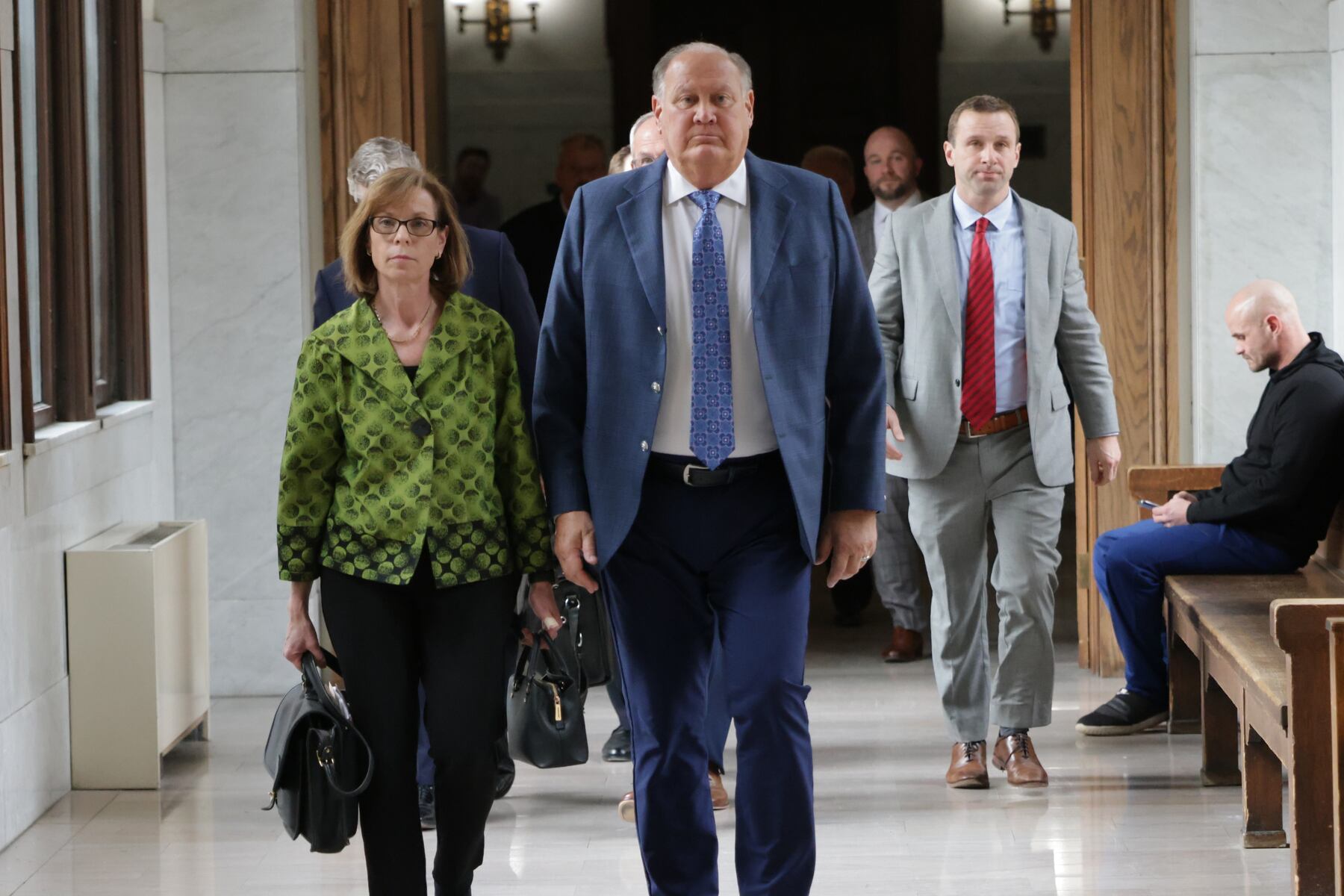Politics
Judge to Rule on Secrecy for Evidence in FirstEnergy Trial

A judge in Summit County, Ohio, is expected to make a significant decision regarding the upcoming corruption trial of two former executives from FirstEnergy. On Friday, Judge Susan Baker Ross will determine whether to continue allowing defense attorneys for ex-FirstEnergy CEO Chuck Jones and former lobbyist Mike Dowling to keep extensive evidence and potential exhibits confidential until after the trial.
This confidentiality arrangement stems from an agreement signed in 2022 by Ohio Special Assistant Attorney General Matt Meyer and the defense attorneys. The agreement permits either party to designate pretrial discovery materials as “confidential” simply by marking them as such. If there are objections to this designation, Judge Ross will have the final say on whether the material should be made public.
Jones and Dowling face serious allegations of paying a $4.3 million bribe to Sam Randazzo in 2019, just before he assumed his role as the state’s top utilities regulator. In recent filings, the defense has labeled numerous pieces of evidence as confidential, including witness interviews and documents that have already been made public, such as a consulting agreement between FirstEnergy and Randazzo, who passed away in 2022.
The defense has also sought to keep reports from experts, such as former FBI agent Sherine Abadi and accounting expert Gary Goolsby, under wraps. Additionally, many of the filings submitted by the defense contain extensive redactions, raising concerns about transparency in the legal proceedings.
Meyer has accused the defense of exploiting the confidentiality agreement to improperly shield evidence that could be detrimental to their case. In an October 6 brief, Meyer stated, “By insisting on sealing any and all information that they believe might be harmful, it is Jones and Dowling who have pushed the balance far beyond what Ohio law requires.” He criticized Judge Ross for granting the defendants broad leeway to keep information secret, asserting that they should not receive special treatment as criminal defendants.
In response, Carol Rendon, representing Jones, argued that their intent is not to hide all documents but to protect witness interviews and summaries until after the trial. This, she contended, is essential to prevent influencing potential jurors or other witnesses. Rendon also pointed out that prosecutors had previously sought similar confidentiality in a federal civil suit against FirstEnergy, initiated by investors affected by the fallout from the House Bill 6 scandal.
Judge Ross has indicated a desire for both sides to reach an agreement regarding what should remain confidential. During a hearing in August, she acknowledged the unusual nature of this case, stating, “This is a new one for me. I’ve never had a criminal case of this magnitude with a protection order of this stipulated confidentiality agreement.” Despite her concerns, she also recognized the reputational stakes for Jones and Dowling.
Legal experts note that attempts to keep extensive pretrial information confidential are not common but do occur in high-profile cases. Michael Gentithes, a law professor at the University of Akron, emphasized that such disputes are typical, with one side often pushing for secrecy while the other demands transparency. “At some point, the judge will have to make a decision on that balance,” he remarked.
The allegations against Jones and Dowling suggest a long-standing scheme to bribe Randazzo for favorable regulatory decisions. Prosecutors claim evidence, including communications between the three, indicates that Randazzo made decisions benefiting FirstEnergy, overriding staff recommendations and other commissioners.
Both Jones and Dowling have pleaded not guilty to over two dozen felony charges, including first-degree charges of bribery and engaging in a pattern of corrupt activity. The trial is scheduled to commence in January 2024. If found guilty, both could face substantial prison sentences. Additionally, they are facing federal charges related to an alleged $60 million bribery scheme involving former Ohio House Speaker Larry Householder. Householder is currently serving a 20-year prison sentence for his role in the corruption case.
As the legal proceedings continue, the decision on evidence confidentiality will play a crucial role in shaping the trial’s dynamics and public perception of this high-stakes case.
-

 Lifestyle3 months ago
Lifestyle3 months agoLibraries Challenge Rising E-Book Costs Amid Growing Demand
-

 Sports3 months ago
Sports3 months agoTyreek Hill Responds to Tua Tagovailoa’s Comments on Team Dynamics
-

 Sports3 months ago
Sports3 months agoLiverpool Secures Agreement to Sign Young Striker Will Wright
-

 Lifestyle3 months ago
Lifestyle3 months agoSave Your Split Tomatoes: Expert Tips for Gardeners
-

 Lifestyle3 months ago
Lifestyle3 months agoPrincess Beatrice’s Daughter Athena Joins Siblings at London Parade
-

 World3 months ago
World3 months agoWinter Storms Lash New South Wales with Snow, Flood Risks
-

 Science3 months ago
Science3 months agoTrump Administration Moves to Repeal Key Climate Regulation
-

 Business3 months ago
Business3 months agoSoFi Technologies Shares Slip 2% Following Insider Stock Sale
-

 Science2 months ago
Science2 months agoSan Francisco Hosts Unique Contest to Identify “Performative Males”
-

 Science3 months ago
Science3 months agoNew Tool Reveals Link Between Horse Coat Condition and Parasites
-

 Sports3 months ago
Sports3 months agoElon Musk Sculpture Travels From Utah to Yosemite National Park
-

 Science3 months ago
Science3 months agoNew Study Confirms Humans Transported Stonehenge Bluestones









